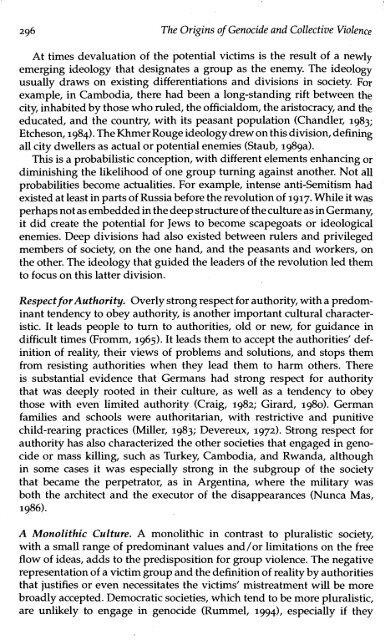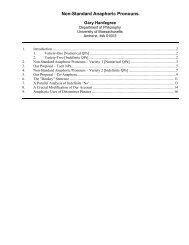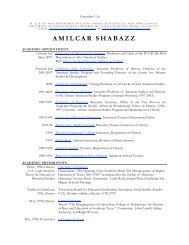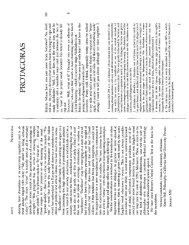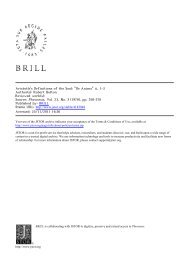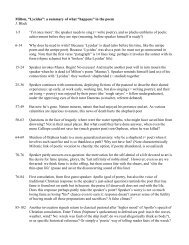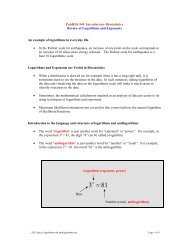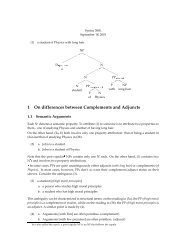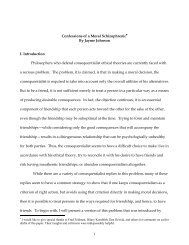The Psychology of Bystanders, Perpetrators, and Heroic Helpers
The Psychology of Bystanders, Perpetrators, and Heroic Helpers
The Psychology of Bystanders, Perpetrators, and Heroic Helpers
Create successful ePaper yourself
Turn your PDF publications into a flip-book with our unique Google optimized e-Paper software.
296 <strong>The</strong> Origins <strong>of</strong> Genocide <strong>and</strong> Collective Violence<br />
At times devaluation <strong>of</strong> the potential victims is the result <strong>of</strong> a newly<br />
emerging ideology that designates a group as the enemy. <strong>The</strong> ideology<br />
usually draws on existing differentiations <strong>and</strong> divisions in society. For<br />
example, in Cambodia, there had been a long-st<strong>and</strong>ing rift between the<br />
city, inhabited by those who ruled, the <strong>of</strong>ficialdom, the aristocracy, <strong>and</strong> the<br />
educated, <strong>and</strong> the country, with its peasant population (Ch<strong>and</strong>ler, 1983;<br />
Etcheson, 1984). <strong>The</strong> Khmer Rouge ideology drew on this division, defining<br />
all city dwellers as actual or potential enemies (Staub, 1989a).<br />
This is a probabilistic conception, with different elements enhancing or<br />
diminishing the likelihood <strong>of</strong> one group turning against another. Not all<br />
probabilities become actualities. For example, intense anti-Semitism had<br />
existed at least in parts <strong>of</strong> Russia before the revolution <strong>of</strong> 1917. While it was<br />
perhaps not as embedded in the deep structure <strong>of</strong> the culture as in Germany,<br />
it did create the potential for Jews to become scapegoats or ideological<br />
enemies. Deep divisions had also existed between rulers <strong>and</strong> privileged<br />
members <strong>of</strong> society, on the one h<strong>and</strong>, <strong>and</strong> the peasants <strong>and</strong> workers, on<br />
the other. <strong>The</strong> ideology that guided the leaders <strong>of</strong> the revolution led them<br />
to focus on this latter division.<br />
Respect for Authority. Overly strong respect for authority, with a predominant<br />
tendency to obey authority, is another important cultural characteristic.<br />
It leads people to turn to authorities, old or new, for guidance in<br />
difficult times (Fromm, 1965). It leads them to accept the authorities' definition<br />
<strong>of</strong> reality, their views <strong>of</strong> problems <strong>and</strong> solutions, <strong>and</strong> stops them<br />
from resisting authorities when they lead them to harm others. <strong>The</strong>re<br />
is substantial evidence that Germans had strong respect for authority<br />
that was deeply rooted in their culture, as well as a tendency to obey<br />
those with even limited authority (Craig, 1982; Girard, 1980). German<br />
families <strong>and</strong> schools were authoritarian, with restrictive <strong>and</strong> punitive<br />
child-rearing practices (Miller, 1983; Devereux, 1972). Strong respect for<br />
authority has also characterized the other societies that engaged in genocide<br />
or mass killing, such as Turkey, Cambodia, <strong>and</strong> Rw<strong>and</strong>a, although<br />
in some cases it was especially strong in the subgroup <strong>of</strong> the society<br />
that became the perpetrator, as in Argentina, where the military was<br />
both the architect <strong>and</strong> the executor <strong>of</strong> the disappearances (Nunca Mas,<br />
1986).<br />
A Monolithic Culture. A monolithic in contrast to pluralistic society,<br />
with a small range <strong>of</strong> predominant values <strong>and</strong>/or limitations on the free<br />
flow <strong>of</strong> ideas, adds to the predisposition for group violence. <strong>The</strong> negative<br />
representation <strong>of</strong> a victim group <strong>and</strong> the definition <strong>of</strong> reality by authorities<br />
that justifies or even necessitates the victims' mistreatment will be more<br />
broadly accepted. Democratic societies, which tend to be more pluralistic,<br />
are unlikely to engage in genocide (Rummel, 1994), especially if they


